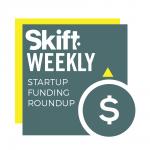Skift Take
This week travel startups announced more than $40 million in funding. Notably two of the companies, travel medical insurance seller SafetyWing and upselling tech firm HotelFlex, are graduates of the famed Y Combinator startup accelerator.

Travel Startup Funding This Week
Each week we round up travel startups that have recently received or announced funding. Please email Travel Tech Reporter Justin Dawes at [email protected] if you have funding news.
This week travel startups announced more than $40 million in funding.
>>Fever, a company that studies consumer data to recommend events and experiences for booking and helps companies plan events, raised a $35 million Series D funding round.
Rakuten Capital, the corporate venture capital arm of Japanese e-commerce Rakuten, led the round. Rakuten, which runs a large online travel business unit, will become a commercial partner.
Accel, Atresmedia, and others also participated in the investment round. The startup has raised more than $76 million to date.
Fever is mainly a marketplace matching consumers with experiences in major cities such as London, New York, Paris, and Madrid. But it also helps brands create events, such as product launches. For example, it runs Fever Originals, creating its own events using “a data-driven content creation strategy.”
>>Aervio, a travel management company, has raised about $1.6 million (€1.4 million) in funding in stages.
Palladium Corporate Ventures and TheVentureCity participated.
The Barcelona-based startup supplements human agents with a chatbot that promises to recognize and respond to natural-language requests for business travel requests. It has about 200 clients.
>>SafetyWing, which offers medical coverage policies to travelers, has raised $3.5 million (€3.15 million) in seed funding.
ByFounders led the round. Credit Ease Fintech Fund and DG Incubation also invested. The Oslo-based startup graduated from the Y Combinator incubator and has received backing from Nordic Web Ventures, NordicVest Angels, and the Norwegian Investment Authority.
SafetyWing began offering medical coverage by monthly subscription last year for policies typically starting at 28 days. Some leisure travelers buy policies. But the startup’s most typical clients are long-term travelers, including remote workers who are temporary expats. The company competes against established players like World Nomads and TravelGuard.
>>HotelFlex, which gives hotels a way to generate additional revenue from early check-ins and late checkouts, recently raised a $800,000 seed round.
Y Combinator, SCM Advisors, and several angel investors from across the hotel industry participated.
The London-based startup, founded in 2016, integrates into a hotel’s property management system and automatically assesses room inventory. When empty rooms arise, the software offers the rooms to guests already staying in the hotel so that they can extend their stay through an early check-in or late checkout.
“Hotels often offer guests early check-in or late checkout for free or priced at a fixed rate that is never optimized,” said co-founder and CEO Max Shepherd-Cross. “HotelFlex brings the same level of automation and intelligence to offering and pricing early check-ins and late checkouts as revenue management software brings to overnight stays,” he claimed.
Skift Cheat Sheet:
We define a startup as a company formed to test and build a repeatable and scalable business model. Few companies meet that definition. The rare ones that do often attract venture capital. Their funding rounds come in waves.
Seed capital is money used to start a business, often led by angel investors and friends or family.
Series A financing is typically drawn from venture capitalists. The round aims to help a startup’s founders make sure that their product is something that customers truly want to buy.
Series B financing is mainly about venture capitalist firms helping a company grow faster, or scale up. These fundraising rounds can assist with recruiting skilled workers and developing cost-effective marketing.
Series C financing is ordinarily about helping a company expand, such as through acquisitions. In addition to VCs, hedge funds, investment banks, and private equity firms often participate.
Series D, E and beyond These mainly mature businesses and the funding round may help a company prepare to go public or be acquired. A variety of types of private investors might participate.
Check out Skift’s Top Travel Startups to Watch in 2019, here.
The Daily Newsletter
Our daily coverage of the global travel industry. Written by editors and analysts from across Skift’s brands.
Have a confidential tip for Skift? Get in touch
Tags: funding, startups, vcroundup
Photo credit: A scene from an event last year at the venue NuBel in Madrid, which was advertised on the booking site Fever. The event tech startup Fever, which studies consumer data to recommend experiences for booking and helps companies plan events, has raised a $35 million round. Fever
